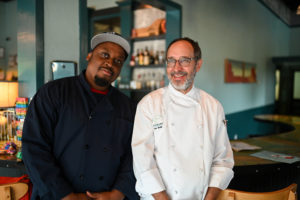
Photos by: Brian Manning
The writer of this PGF Story is Laura Bonds.
For Memphis restaurateurs Ben Smith and Kevin Sullivan, owner and head chef of Tsunami, sustainable practices are more than ingrained systems in their workplace; they are an expression of valuing one’s neighbor. Maintaining an environmentally-friendly mindset has been at the restaurant’s core since opening more than two decades ago. When Margo McNeely, the founder of Project Green Fork, approached Smith after founding the organization in 2008, Smith jumped at the chance to support another local entrepreneur and move the industry toward a cleaner, more thoughtful approach to owning a restaurant.
Tsunami continues its proactive commitment and leads the way for others in the business by repurposing ingredients, composting scraps, participating in the food ecosystem with farmers and recycling.
Repurposing food is a cost-effective measure and helps the environment by reducing waste and ensuring the carbon footprint of food deliveries is limited. For a creative chef like Smith, it also provides inspiration for dishes and allows overlooked ingredients to become stars of the plate. “One advantage we have is the constantly changing menu every week. We repurpose, we re-bottle, reuse, revitalize,” Smith says. “Because of that flexibility we can look at something and find inspiration from one ingredient.” “We try to repurpose everything,” Sullivan adds, and what few scraps of unusable food are left become composted.

In addition to repurposing and composting, Tsunami works with in-season ingredients and maintains relationships with farmers to curb its carbon footprint, support local vendors and deliver exceptionally fresh food. “Follow the principles of seasonality and locality and you cut out so many of the issues that plague this country today; you know, waste, carbon footprint, not really good produce,” Smith says. In its early years, Tsunami supported a local farmer who sold produce from his truck bed in the parking lot. Since that first relationship, Smith and Sullivan have continued cultivating partnerships with vendors. To Tsunami, being an active member of the farmer/restaurant ecosystem is as important as having clean flatware, crisp linens and good service. The restaurant encourages others to participate in a community of sustainability and support as well.
Any restaurant could recycle, feel good about helping the environment and call it a day. But Tsunami goes further, with Smith committed to educating employees on the business and environmental impacts of upholding sustainable practices. His desire to train employees and make recycling and composting second nature reflects his authentic passion to advance the industry. “It takes consciousness to move forward,” and with the assistance of Project Green Fork, “The added bonuses of having a more organized process of dealing with it makes it easier on us.”
As an entrepreneur and visionary chef, Smith is always seeking to differentiate and isn’t content with the status quo. He wants to continue evolving his restaurant and its sustainable operations and hopes his example will encourage the community of restaurateurs to adopt similar practices. Working closely with Project Green Fork, Tsunami finds inspiration and leads the industry toward a more sustainable future.
